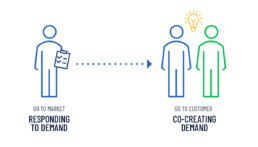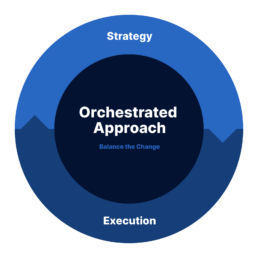We live in an experience economy where the digital customer experience is paramount to commercial health.
What Is Go to Customer Strategy?
Go to Customer is a transformative commercial strategy that focuses on expansive account growth vs. a linear, acquisition-based go-to-market strategy. As a growth strategy, Go to Customer works backwards from the wallet owners that drive the majority of revenue and profit to establish a sustainable commercial system. A go-to-customer approach models customer environments, maps your capabilities and expertise, and matches the right value-based messages to executive buyers based on their desired outcomes. Traditional go-to-market strategies that focus on acquisitions and selling products do not deliver this customer-focused thinking.

Why Go to Customer Strategy Is Important
To drive profitable growth today, companies need to move from responding to demand to co-creating demand with customers. The key to differentiation in the modern economy is experience. Namely, the overall digital buying experience. The 4Ps — Product, Place, Promotion, Price — that have been the cornerstone of go-to-market models since the 1960s are being replaced with Possibility, Pattern, Path, Proof.
Moving away from go-to-market strategies that put product at the heart of everything and pivoting to a flexible portfolio of operating models based on desired outcomes is a big shift in the status quo. It is absolutely necessary if you want to improve commercial health and create sustainable commercial systems.

Markets Don't Write Checks, Customers Do
B2B’s focus and effort is opposite of where it should be. They primarily sell to lower levels when 80 percent of annual B2B spend is driven by .5 percent of B2B entities including public, private, and governments that have over $100M in revenue globally. These entities are entire markets unto themselves. Companies need to effectively mine them for growth. This takes new muscles, methods, and technology to provide insights and experiences that will matter most in a post-COVID digital economy.
Commercial Systems Are Broken, Not Salespeople
Decades of go-to-market strategy have left sales teams ill-equipped to sell into higher levels of an organization and reach wallet owners. Buyer alignment has been poor for years and COVID-19 only made matters worse. We hear time and again from executives that sales meetings are a waste of time because salespeople don’t understand their issues or how they can help. This pervasive perception indicates a flaw in the commercial system, not personnel. Companies need to do a better job preparing sales teams and helping customers envision what’s possible to achieve together.

How to Implement Go-to-Customer Approach
Go-to-customer-strategy requires an outside-in approach to understanding your customer’s perspective. Leveraging deep insight into account buying centers, stakeholders, and agreement networks, you can configure solutions and scope of desired outcomes that map to different executive levels, as well as relevant buyer experiences that reflect the “rhythm” of the relationship. This information is then fed back into your company to improve and inform your commercial process. Our proven approach helps companies orchestrate this change.
Productitis
The #1 Risk to Your Company’s Commercial Health
Whether it’s diagnosed or not, most companies suffer from Productitis. This condition creates confusion, inefficiency, and poor commercial performance where sales and marketing expenses outpace revenue growth.
Commercial Ratio
How Healthy Is Your Commercial System?
A vital component to commercial health is the Commercial Ratio. The Commercial Ratio measures system productivity by evaluating revenue growth divided by the total cost of sales and marketing.
Growth Strategy
Why Go to Customer Makes Sense for Large Accounts
Pipelines are not the future flow of revenue into your company; contracts are. Remember the 80/20 rule. Focusing your growth strategy on wallet owners can make a big impact.










